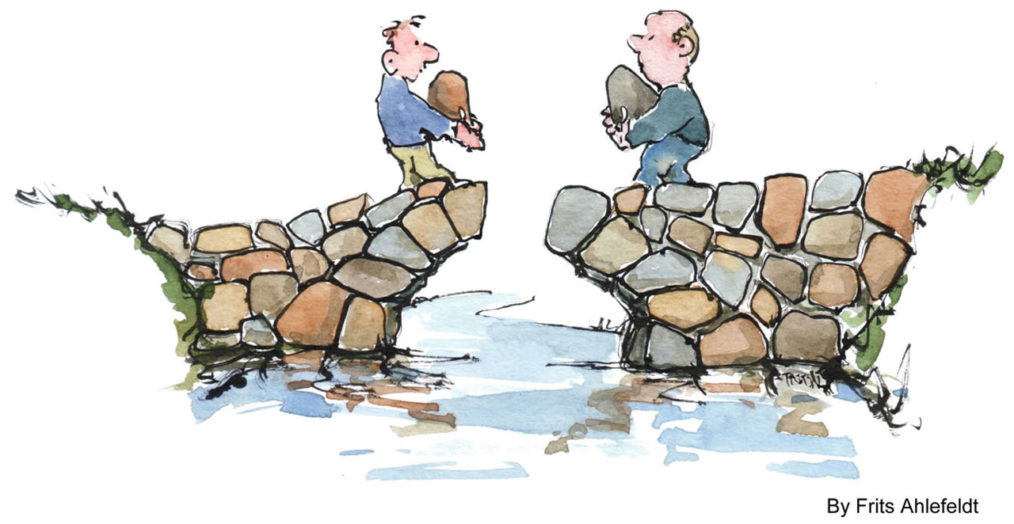
Hello, Neighbors!
As part of the course Intergroup Relations, third-year psychology students write a popular science article about stereotypes and prejudices. Mindwise publishes a modified version of two of these articles. Today’s article is written by Lena Paulsen, Louise Teschemacher, and Felix Grundmann.
You and I are likely to share a postal code with people with diverse cultural backgrounds. Modern Europe is a place where people from all over the world live side by side next to each other. In the past years, immigration changed the face of the European landscape. Unfortunately however, people still don’t mix very well. In the Netherlands, anxiety and unease often characterize the interactions between “old”- and “new”-Europeans.
I met Mohammed who told me: “Only last week some school kids told me to go back to my country. They called me a terrorist and told me to learn Dutch. They didn’t allow me to tell them that I was born here and always felt Dutch, that I am fluent in their language and that I am about to obtain a Master’s Degree. People only seem to notice my Muslim name and my dark hair.” This is just one of many stories I heard. But why should we care about Mohammed and his situation? Given the ongoing immigration, contact between members of different cultural groups will only increase. Therefore, let’s get rid of our negative feelings and ensure that happiness and harmony continue to be characteristics of the Dutch population.
“They didn’t allow me to tell them that I was born here and always felt Dutch, that I am fluent in their language and that I am about to obtain a Master’s Degree. People only seem to notice my Muslim name and my dark hair.”
Those kids who met Mohammed expressed thoughts and emotions that many of us may have had at some point. Our conceptions of others, especially of those we don’t know much about, are not only informed by personal experiences, but also by what our friends tell us, what our parents taught us, and especially by what is shown on television. We come to learn to associate (Muslim) immigrants with terrorism. Terroristic acts of individuals are widely publicized and discussed. As a consequence, concepts such as ‘Muslim’ and ‘violence’ are repeatedly activated together. This leads us to form an association between these two concepts. The Islam erroneously becomes a synonym for violence and hate. We see our world and our cultural values endangered. Muslim immigrants introduce a novel practices and traditions, such as fasting during the month of Ramadan, women wearing hijabs, and avoiding pork meat. We are unsure how to interact with them, and feelings of uncertainty and anxiety arise. We don’t only see our current ways in danger but also our future. Immigrants might constitute unwanted competition, making it harder to find or keep a job. We emphasize differences between ourselves and immigrants while discounting similarities that exist between them and us. We perceive them as a strange and unlikable group whose members have little to nothing in common with us.
“Concepts such as ‘Muslim’ and ‘violence’ are repeatedly activated together. This leads us to form an association between these two concepts. The Islam erroneously becomes a synonym for violence and hate.”
Indeed, there is a truth which we should not discard, namely, that the majority of people living in the Netherlands wants to overcome prejudice and to live peacefully in a diverse society. How can this be achieved? Let’s start by tackling our perceptions of immigrants’ alien nature. Let’s form a realistic picture by grounding it on first-hand experience. Let’s come up with a plan: If I run into an immigrant, then I will talk to them, approach them. No matter how they are labeled, they are also soccer fans, dancing to Beyoncé, and unable to fall asleep after watching the latest horror movie. They are individuals with whom we share experiences such as falling in love, being heart-broken, losing a friend, getting a degree, or moving out.
“Let’s form a realistic picture by grounding it on first-hand experience.”
So, let’s put our differences aside and focus on what we share. On a larger scale, let’s organize neighbourhood-get-togethers. Everyone is welcome. It’s a space created to allow people to chat, to get to know each other, and to experience the cultures surrounding us. Let’s cook together, watch movies from different countries, and maybe even learn a new language. Let’s have fun together. Let’s broaden our horizon by embracing novelty and diversity with open arms.
Positive relationships between cultural groups are the key to a brighter future. Lincoln got it wrong when he wrote that ‘for every enemy there is a friend’; it should be ‘in every “enemy”, there is a friend’.
Watch this video for an illustration of the recategorization approach.
Note. Picture by Frits Ahlefeldt.



